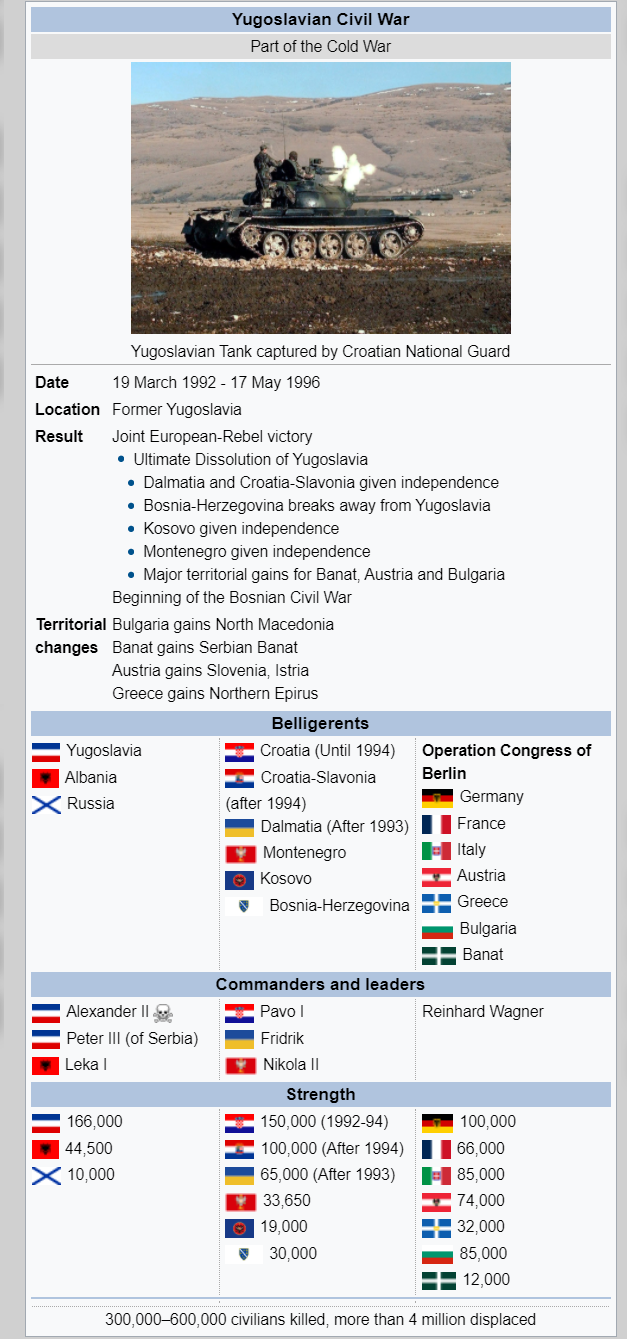HOME | DD
 davoid123 — Yugoslavian Civil War
davoid123 — Yugoslavian Civil War

#alternatehistory #infobox
Published: 2021-03-05 06:21:49 +0000 UTC; Views: 4695; Favourites: 14; Downloads: 0
Redirect to original
Description
The Kingdom of Yugoslavia had always been an unpopular nation in Europe. Characterised by ethnic conflict, domestic infighting and heavy-handed suppression of any and all attempts to bring equality between the various peoples under Serbian domination during its 74 years of existence, it had only remained intact due to the fact that major European powers believed it was better to leave the affairs of the Balkans to their own -lock the South Slavs in and throw away the key, so to speak- than to make it any of their responsibilities.Founded right after the First Great War when Serbia was given control of North Macedonia, Croatia, Slovenia and Bosnia-Herzegovina, Yugoslavia played neutral for much of its next 74 years. It did not take part in the Second Great War, it took sidelessness in the Cold War despite being bordered on the two sides by the European Community and the Commonwealth of Independent States, and it took an isolationist, autarkist socio-economic stance, effectively cutting itself off from the outer world. Yugoslavia put down 17 revolts by Croatians -the major opponent of Serbian domination in the Balkans- and after 1980 was in a de facto state of ethnic infighting between state-sponsored Serbian militias attempting to ethnically cleanse Bosnia-Herzegovina and Croatia and their victims.
This state of existence led to the Yugoslavian Civil War in 1992 when Croatia, Montenegro and Bosnia-Herzegovina unilaterally declared themselves independent of what they called 'The Illegitimate Serb Government'. Yugoslavia, under rule of the already unpopular King Alexander II Karađorđević, reacted immediately by mobilising all their reserves and marching north on Croatia alongside their only ally Albania, nearly immediately overrunning Montenegro but getting slogged by Croatian and Bosnian forces in Sarajevo. Things only became worse when seven member-states of the European Community, five of them Yugoslavia's neighbors that had held territorial claims on its possessions for the duration of its existence, met in Aachen to debate whether or not to intervene in the 'ongoing Yugoslavian Crisis'. Pledging to retake their territories and reducing Yugoslavia to a Serbian Rumpstate 'no larger than it had been before the Balkan Wars', Germany, France, Italy, Bulgaria, Greece, Austria and Banat mobilised 454,000 soldiers in what they called Operation Congress of Berlin in 1993 and intervened, quickly occupying North Macedonia, Slovenia, Istria and parts of Vojvodina and Northern Epirus. Three years later, Yugoslavia was thrown in the dustbin of history and the Balkans once again had returned to the larger world.

























